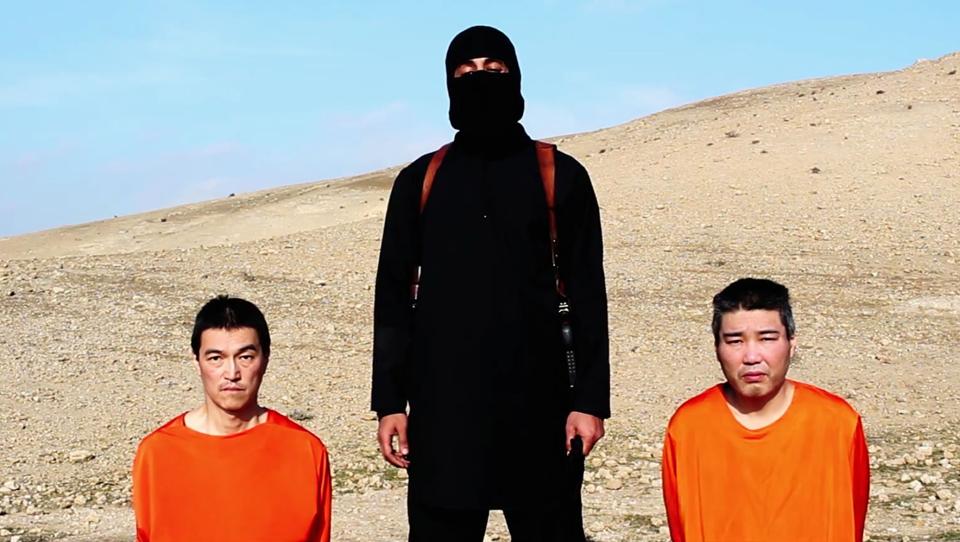Japan said Thursday it was considering all possible ways to gain the release of two hostages held by the Islamic State group, as two people with contacts there offered to try to negotiate.
The Islamic State group, in a video message seen Tuesday, said it would kill the hostages within 72 hours unless it receives $200 million. Based on the video's release time, that deadline would come sometime Friday.
Government spokesman Yoshihide Suga said Thursday that Japan was trying to reach those holding the hostages, 47-year-old freelance journalist Kenji Goto and 42-year-old Haruna Yukawa, the founder of a private security company.
Suga said Japan had not received any message from IS since the release of the video.
Ko Nakata, an expert on Islamic law and former professor at Kyoto's Doshisha University, told reporters he was able to reach the Islamic State.
He and Kosuke Tsuneoka, a Japanese journalist who was held hostage in Afghanistan in 2010, have both offered to reach out to the Islamic State to try to save the hostages.
"Seventy-two hours is too short a time, and I myself am prepared to go to negotiate," Nakata said, speaking in both Japanese and in Arabic.
He urged the Islamic State group not to harm the hostages, saying releasing them would be a good deed that would improve its image.
Tsuneoka put out a tweet Wednesday offering to go with Nakata on such a mission, saying that if the Islamic State could guarantee their safety and accept them as negotiators, "we can directly appeal for the release of Mr. Yukawa and Mr. Goto from the Islamic State."
Asked if Japan would consider the offer by Tsuneoka and Nakata to intercede, Suga said Tokyo was "prepared to consider all possible ways to save the two hostages."
It is unclear whether the two private citizens would be able to contact and negotiate with the Islamic State group even if they were to travel to Syria. Japan lacks any diplomatic presence in Syria.
Prime Minister Shinzo Abe, who returned from a six-day Middle East tour on Wednesday, vowed not to give in to terrorism, and to continue to cooperate on providing humanitarian aid to those affected by conflict in the region.
Abe and other Japanese officials have not said directly whether Japan will pay ransom for the captives — a decision fraught with implications both for Japan and other countries.
The issue was raised by British Defense Secretary Michael Fallon on Wednesday in talks in London among the British and Japanese foreign and defense ministers.
He "advised that we should always keep in mind what happens next as a result of our acts. He advised there will be consequences if we do not act strongly now," Defense Minister Gen Nakatani told reporters in London.
Japan has received offers for cooperation in the crisis from a number of countries, including Jordan, where Japanese Vice-Foreign Minister Yasuhide Nakayama met with King Abdullah II.
Abe dispatched Nakayama to Jordan to coordinate handling of the hostage crisis, but it was unclear if any progress was being made.
"Time is very short and we are very worried," Nakayama told reporters after his meeting with the king.
Abe has limited choices, among them to openly pay the extremists or ask an ally like the United States to attempt a risky rescue inside Syria. Japan's military operates only in a self-defense capacity at home.
But officials are adamant that Japan will continue to provide non-military aid to the region.
"We will never give in to terrorism," Abe said.
In past hostage situations involving Japanese captives, at least one has been killed while most have been released. It is unclear how many times Japan paid ransom. The only confirmed case was in Kyrgyzstan in 1999.
Japanese media reported Wednesday, citing unnamed officials, that Goto's wife received an email in December demanding a ransom of more than 2 billion yen ($17 million).
She exchanged several emails with the unknown person, whose email address was similar to one used by the Islamic State group, the Kyodo News service and other media reported. The messages did not include a threat to kill Goto, the reports said.
Securing the hostages' release will be hard, "because all Japanese diplomats left Syria as the civil war escalated," Tsutomu Ishiai, foreign news editor for the major newspaper Asahi Shimbun, said in a commentary.
"Japan is in an extremely difficult situation. It needs to find a way to save the hostages by getting in touch with religious leaders and local heavyweights who are in a position to make contact with the extremists," he added.
/129
source : AP
Thursday
22 January 2015
8:27:18 AM
666345

Japan said Thursday it was considering all possible ways to gain the release of two hostages held by the Islamic State group, as two people with contacts there offered to try to negotiate.
